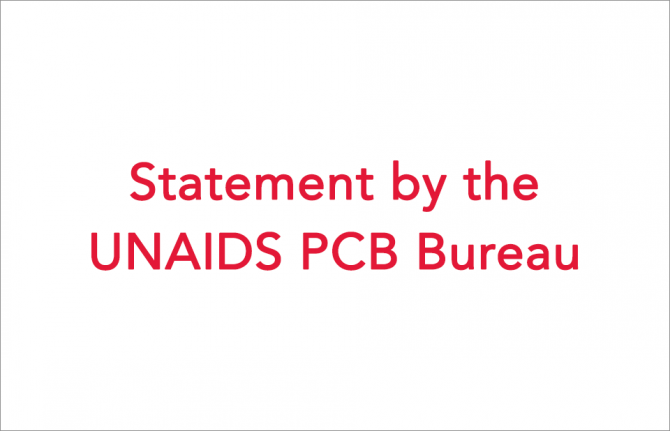

Feature Story
Statement by the UNAIDS Programme Coordinating Board Bureau
25 September 2025
25 September 2025 25 September 2025GENEVA, 25 September 2025— Following the publication of the UN80 Initiative progress report on 18 September 2025, the Bureau of the UNAIDS Programme Coordinating Board (PCB Bureau) convened an extraordinary meeting on 22 September to discuss the report’s proposal related to UNAIDS.
The PCB Bureau—comprising Brazil (Chair), the Netherlands (Vice-Chair), Kenya (Rapporteur), the NGO Delegation, and the International Labour Organization (ILO) as Chair of the Committee of Cosponsoring Organizations (CCO)—reaffirmed the decisions taken by the UNAIDS Board and the UN Economic and Social Council (ECOSOC) in June and July 2025, which provide a clear, two-phase roadmap for the transformation of UNAIDS. As these are consensus decisions by the governing bodies of the UNAIDS Joint Programme, the Bureau believes they are critical elements of any next steps in UN80 deliberations as they pertain to UNAIDS.
The decisions of the UNAIDS Board in June 2025 have been based on an inclusive process involving all stakeholders in the AIDS response and initiated by the UNAIDS Board in December 2023 at its 53rd meeting, where the Board requested the UNAIDS Executive Director and the CCO to revisit the operating model.
To that end, the UNAIDS Executive Director and the ILO Director General, on behalf of the Joint Programme, convened a High-Level Panel of diverse stakeholders in the HIV response, which made a set of recommendations to the Joint Programme.
On the basis of these recommendations, the UNAIDS Executive Director and the Director-General of the ILO presented a revised operating model to the Board for its consideration and the Board made the following decisions:
- Welcomes the work and recommendations of the High-Level Panel on a resilient and fit-for-purpose UNAIDS Joint Programme in the context of the sustainability of the HIV response;
- Takes note of the Executive Director and CCO’s Report on the recommendations for revisions to the Joint Programme operating model (UNAIDS/PCB(56)25.15);
- Welcomes the clear articulation of the Secretariat’s four core functions as (1) leadership and advocacy; (2) convening and coordination; (3) accountability through data, targets, strategy; and (4) community engagement, while requesting that actions to address inequalities are integrated across these four priorities and recalling the guiding principles of UNAIDS’ work;
- Endorses the revised operating model of the Joint Programme, as set out in this report (UNAIDS/PCB(56)25.15), noting that additional decisions will be taken on the operating model at the Special Session of the PCB in October 2025 and subsequent PCB meetings in line with future decisions of the UN80 Initiative.
- Requests the Executive Director to provide regular updates on the operationalization of the revised operating model starting at the 57th PCB meeting in December 2025;
- Requests the Executive Director, to define a review process of the revised operating model by the 57th PCB in December 2025, in consultation with the Cosponsors and PCB stakeholders, and undertake that review by June 2027 at the latest to inform the PCB’s decision making, subject to ECOSOC decisions, on the further transition of the Joint Programme within the wider UN system to sustain global progress towards ending AIDS as a public health threat.
In July, these decisions were formally noted by ECOSOC in consensus Resolution E/RES/2025/20 on the Joint Programme (https://docs.un.org/en/E/RES/2025/20).
During its discussions on 22 September, Bureau members highlighted the importance of protecting the integrity of the reform process underway and avoiding further disruption to the HIV response, expressing concern that the UN80 progress report did not reflect the recent Board and ECOSOC decisions, leading to confusion among stakeholders, particularly civil society and donors.
The Bureau recalled that the proposals in the UN80 report are non-binding and that it is the responsibility of the governing bodies to determine the way forward, as emphasized by the Secretary-General. In this context, the Bureau has added an agenda item on implementation of the UNAIDS revised operating model and UN80 to the Special Session of the PCB on 8 October 2025, before the UNAIDS Board considers the 2026 Workplan and Budget.
The PCB Bureau acknowledges UNAIDS' commitment to a transparent, inclusive and responsible transformation, adhering to the decisions of its governing bodies, aligned with the broader objectives of UN80 reform and towards achieving the goal of ending AIDS as a public health threat by 2030.
